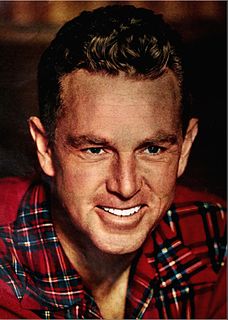A Quote by Sterling Hayden
It's a presumptuous thing to write one's autobiography, but this is really an effort in the deepest sense to explore the struggle of a tortured individual to be himself in a hostile society.
Related Quotes
Sometimes we feel that one individual's action is very insignificant. Then we think, of course, that effects should come from channeling or from a unifying movement. But the movement of the society, community or group of people means joining individuals. Society means a collection of individuals, so that initiative must come from individuals. Unless each individual develops a sense of responsibility, the whole community cannot move. So therefore, it is very essential that we should not feel that individual effort is meaningless- you should not feel that way. We should make an effort.
The achievements of an organization are the results of the combined effort of each individual.
People who work together will win, whether it be against complex football defenses, or the problems of modern society.
Individual commitment to a group effort - that is what makes a team work, a company work, a society work, a civilization work.
There is the great, silent, continuous struggle: the struggle between the State and the Individual; between the State which demands and the individual who attempts to evade such demands. Because the individual, left to himself, unless he be a saint or hero, always refuses to pay taxes, obey laws, or go to war.
There's a lot of material from my life in my books, but they're not really autobiographical, in the sense that they're not about my life. So, in 'A Feather on the Breath of God' I write about my parents, I write about this Russian immigrant, I write about the world of dance, but it isn't an autobiography; so much is left out.
The society wants you to have beautiful personalities; the society wants you to have personalities which are comfortable for the society, convenient for the society. But the person is not the real thing, the individual is the real thing. The individual is not necessarily always comfortable to the society - in fact he is very inconvenient.
What, after all, are the world's deepest problems? They are what they always have been, the individual's problemsâ??the meaning of life and death, the mastery of self, the quest for value and worth-whileness and freedom within, the transcending of loneliness, the longing for love and a sense of significance, and for peace. Society's problems are deep, but the individual's problems go deeper; Solzhenitsyn, Dostoyevsky, or Shakespeare will show us that, if we hesitate to take it from the Bible.
The Adlerians, in the name of "individual psychology," take the side of society against the individual. ... Adler's later thought succumbs to the worst of his earlier banalization. It is conventional, practical, and moralistic. "Our science ... is based on common sense." Common sense, the half-truths of a deceitful society, is honored as the honest truths of a frank world.
There is a very broad theory that society gets the right to hang, as the individual gets the right to defend himself. Suppose she does; there are certain principles which limit this right. Society has got the murderer within four walls; he never can do any more harm. Has society any need to take that man's life to protect itself? If any society has only the right that the individual has, she has no right to inflict the penalty of death, because she can effectually restrain the individual from ever again committing his offence.

































